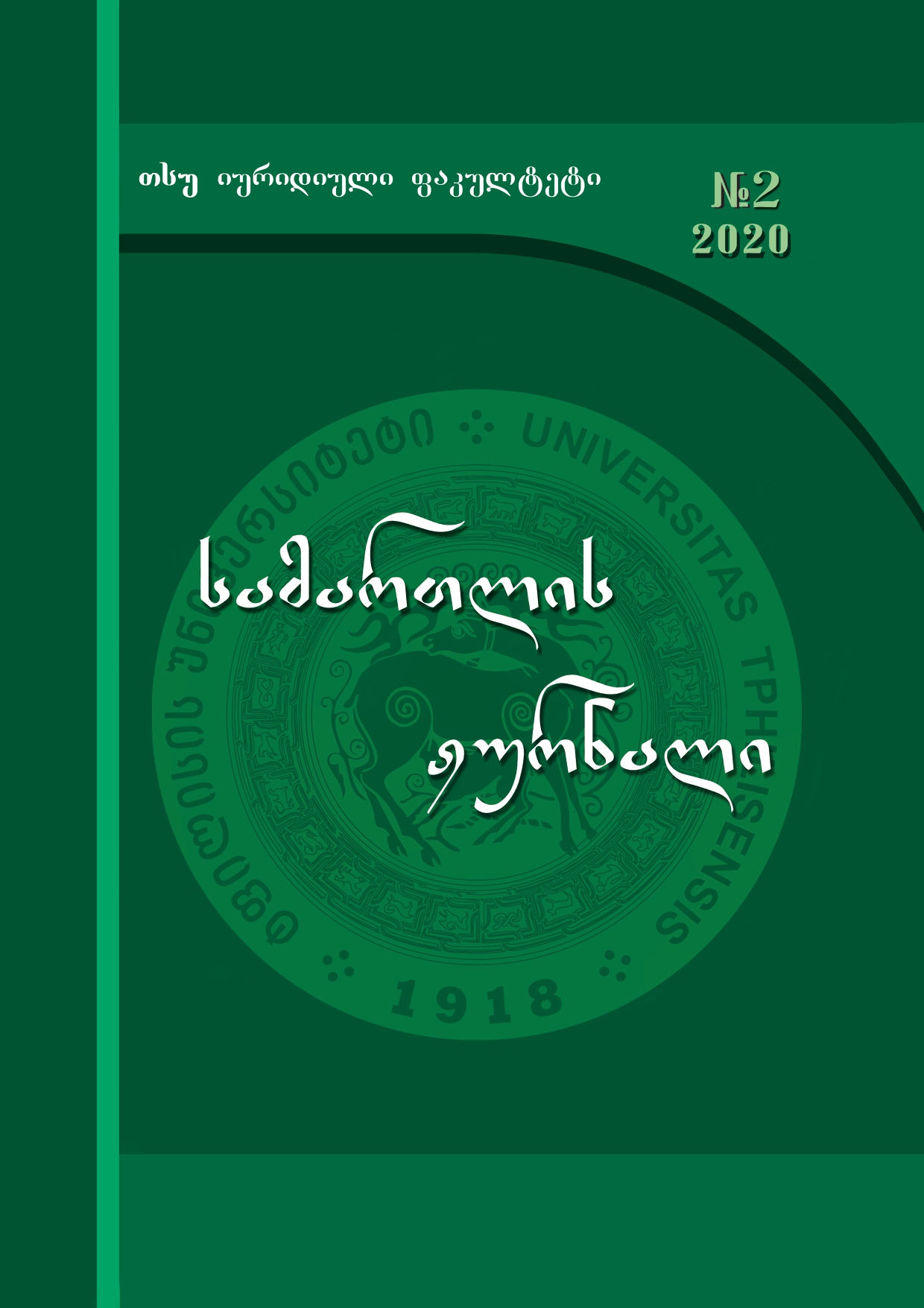დასაქმებულის ცნების გადახედვის მიზანშეწონილობა ტექნოლოგიური პროგრესის გათვალისწინებით
DOI:
https://doi.org/10.48614/jlaw.2.2020.53-68საკვანძო სიტყვები:
დასაქმებული, დამოუკიდებელი კონტრაქტორი, ატიპური დასაქმების ფორმები, თვითდასაქმებული, კვაზი-დასაქმებული, მოთხოვნაზე დამყარებულ ეკონომიკაში დასაქმებული პირი (Gig Worker), დისტანციური შრომა.ანოტაცია
ინოვაციური ტექნოლოგიების სწრაფმა განვითარებამ გამოიწვია დასაქმების ახალი, არასტანდარტული ფორმების გავრცელება, რაც ძირითადად, წარიმართება თვითრეგულირების გზით, ხელშეკრულების თავისუფლების პრინციპის ზოგად ჩარჩოში, სპეციალური საკანონმდებლო მოწესრიგების გარეშე.[1] თუმცა, ატიპურ დასაქმებულებს იმდენად ბევრი საერთო აქვთ სტანდარტულ დასაქმებულთან, მათი გამიჯვნა სასამართლოსთვისაც კი რთულია, რაც სამართლიანად წარმოშობს ამ კატეგორიისათვის შრომითი და სხვა სოციალური დაცვის გარანტიების მინიჭების მოთხოვნას და შესაბამისად, დასაქმებულის დეფინიციის გადახედვის საჭიროებას.
[1] ზოგიერთმა ქვეყანამ მოაწესრიგა მსგავსი კატეგორიის მუშაკთა უფლებები, მაგალითად, იტალია.
წყაროები
Labour Code of Georgia, LHG, 75, 27/12/2010.
Civil Code of Germany, 18/08/1896.
R198 - Employment Relationship Recommendation, 2006 (No.198), ILO.
European Framework Agreement on Telework, (2002).
Attadgie S., Combating the Actors Sacrifice: How to Amend Federal Labour Law to Influence the Labour Practices of Theaters and Incentivise Actors to Fight for their Rights, Cardozo Law Review, Vol., 40, 2018, 1071-1072, 1075.
Bales R., Mikhelidze A., Legal Responses to the Rise of the On-Demand Economy in Georgia and the United States, Modern Law Journal, V.I, Book I, 2019, 97.
Bales R. A., Woo C. P., The Uber Million Dollar Question: Are Uber Drivers Employees or Independent Contractors?, Mercer Law Rev., 463, 2017.
Commentaries to the Labour Code of Georgia, Boroni A. (ed.), Tbilisi, 2016, 114-116,120, 133 (in Georgian).
Cunningham-Parmeter K., From Amazon to Uber: Defining Employment in the Modern Economy, 96 Boston University Law Rev., 2016, 1696.
Dau-Schmidt K. G., The Impact of Emerging Information Technologies on the Employment Relationship: New Gigs for Labour and Employment Law, University of Chicago, Legal Forum, 2018, 64, https://chicagounbound.uchicago.edu/cgi/viewcontent.cgi?article=1591&context=uclf [04.10.2020].
Del Conte M., Gramano E., Looking to the Other Side of the Bench: The New Legal Status of Independent Contractors under the Italian Legal System, Comparative Labor Law & Policy Journal, Vol. 39, 2018, 579-584, 586, 589-590, 594-596.
Duvenhage J., Rajab Suliman v Rasier Pacific PTV LTD: Employee or Independent Contractor? 21.U. Notre Dame Aust. L. Rev.1, 2019, 12.
Eisenbrey R., Mishel L., Uber Business Model Does not Justify a New “Independent Worker” Category, Economic Policy Institute, 2016, https://www.epi.org/publication/uber-business-model-does-not-justify-a-new-independent-worker-category [11.10. 2020].
Fisk C., Hollywood Writers and the Gig Economy, 2017 U. Chi. Legal Forum, 2017, 178.
Labor law of Georgia and international labor standards, Bakakuri N., Todria T., Shvelidze Z. (eds.), ILO, 2017, 43-44, 47 (in Georgian).
Harris S. D., Krueger A. B., A Proposal for Modernizing Labor Laws for Twenty-First Century Work: The “Independent Worker”, The Hamilton Project Discussion Paper 2015, 27.
Hirsch J. M., Future Work, University of Illinois Law Review, Vol. 2020, 924.
Kropholer I., Civil Code of Germany, Darjania T., Tchetchelashvili Z.,( Translators), Chachanidze E., Darjania T., Totladze T. (eds.), 13th ed., Tbilisi, 2014, §611 (1); §618 (1); §307 (in Georgian).
Lobel O., The Gig Economy and the Future of Employment and Labor Law, University of San Francisco Law Review, Forthcoming San Diego Legal Studies Paper No. 16-223, 2016, 8.
Regulating the Employment Relationship in Europe: A Guide to Recommendation No.198. ILO, 2013, 38, 41, 50, 65 https://www.zora.uzh.ch/id/eprint/91131/1wcms_209280.pdf [10.09.2020].
Secunda Paul M., Uber Retirement, University of Chicago, Legal Forum, 2017, 437.
Shvelidze Z., Characteristics of Legal Status of Employee Envisaged under the Labor Code of Georgia, Labor Law, Compilation of Articles, Book I, Tbilisi, 2011, 112 (in Georgian).
Vasilieva Y.V., Shuraleva S.V., The Content of the Remote Work Employment Contract: Theoretical Aspects, Perm University Herald Juridical Sciences, Vol., 28, 2015, 89.
Waas B., The New Legal Status of Independent Contractors: Some Comments from a German Perspective, Comparative Labor Law & Policy Journal, Vol. 39, 2018, 628, 630-633, 635, 636.
Harrell v. Diamond A Entertainment, Inc., US District Court for the Middle District of Florida, 1997 https://law.justia.com/cases/federal/district-courts/FSupp/992/1343/1456769/ [07.09.2020].
Ringling Bros. – Barnum & Bailey Combined Shows v. Higgins, United States Court of Appeals, Second Circuit, 1951, www. casetext.com [07.09.2020].
Club Hubba Hubba v. U.S, United States District Court, D. Hawai'i, 1965, www.casetext.com [07.09.2020].
Radio City Music Hall Corp. v. United States, Circuit Court of Appeals, Second Circuit, 1943, www. casetext.com [07.09.2020].
ჩამოტვირთვები
გამოქვეყნებული
როგორ უნდა ციტირება
გამოცემა
სექცია
ლიცენზია

ეს ნამუშევარი ლიცენზირებულია Creative Commons Attribution-ShareAlike 4.0 საერთაშორისო ლიცენზიით .









